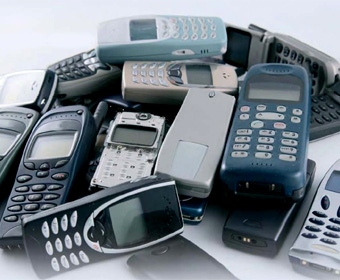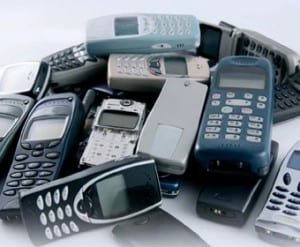Time to meet your maker
August 26, 2008

By Sean Jackson

handsets
Dead Handsets
Schemes to encourage the recycling of mobile phones are growing in number and success as consumers are enticed into greener ways with incentives that range from the feel-good factor of helping a charity to cold, hard cash.
Handset recycling offers arguably the simplest, most visible way for the mobile industry to engage its end users in green activities. Recycling in general is a high profile concept and enjoys relatively strong support from consumers, depending on region. But results from a recent survey carried out by the world’s leading handset vendor, Nokia, suggest that there remains a good deal of work to be done in encouraging consumers that the recycling of mobile phones specifically is worth doing.
The Finnish firm found that only three per cent of consumers around the world recycle their old mobile phones, 75 per cent don’t contemplate the practice and almost 50 per cent are unaware even that it is possible. Nokia surveyed 6,500 people across 13 countries; Finland, Germany, Italy, Russia, Sweden, UK, United Arab Emirates, USA, Nigeria, India, China, Indonesia and Brazil.
The worst case scenario would see old handsets ending up in landfill-an outcome, happily, that Nokia found is not prevailing. Only four per cent of phones met this fate. The problem seems to be one of awareness coupled with apathy; the vast majority of discarded handsets are simply gathering dust in people’s houses. Nokia estimates that up to 80 per cent of each handset can be recycled in one way or another, with awareness the issue that most needs addressing. The survey also revealed that awareness is at its lowest in emerging markets like India and Indonesia, and at its highest in Western markets like the UK and US.
“Nokia is working hard to make [recycling] easier, providing more information and expanding our global take-back programmes,” says Markus Terho, director of environmental affairs at Nokia. “If each of the three billion people globally owning mobiles brought back just one unused device we could save 240,000 tonnes of raw materials and reduce greenhouse gases to the same effect as taking four million cars off the road.”
With collection points for old handsets in 85 countries around the world, Nokia claims to facilitate the largest voluntary recycling scheme in the mobile industry. But increasing awareness alone will not boost the number of people motivated to recycle. It has to be made as simple and convenient as possible for consumers to recycle their handsets, because people can be very lazy.
Olly Tagg is marketing director for Corporate Mobile Recycling. The firm operates a range of schemes under its own brands in the UK as well as in association with various charities, and is looking to expand internationally through offices in Spain and Australia. Tagg highlights the problem of lethargy. “Often people are sitting on a phone at home that could be five years old and of no value to them. But they haven’t thrown it out because they know it’s wrong to put it in landfill.” Yet still they are not motivated or proactive enough to recycle them.
“We put a recycling bag in the box of every phone that we sell, in every channel, direct or indirect. That’s the first thing that our customers see when they open up the box,” says Allison Murray, head of corporate responsibility at the UK arm of Deutsche Telekom’s T-Mobile. “We ask our customers to take out the SIM card, erase all data from their old phones and send them back to us for recycling.” This initiative has been in place for a year or so, says Murray, and was introduced in response to consumer demand. In the months following its launch, handset recycling numbers among T-Mobile’s customer base trebled, she adds. The carrier offers its customers up to £80 for any handset sent back, with newer, higher spec products naturally commanding a higher fee. Consumers can opt to pledge any fee to a charity of their choice, or they can keep the money for themselves. There are some who believe that the public should be educated about environmental issues to the extent that they are motivated to recycle out of their understanding of the necessity. But financial reward is a popular tactic.
It has proven popular in the US, where fiscal incentives in certain communities have increased the recycling of household waste by as much as 200 per cent, according to the UK Conservative Party’s shadow Chancellor, George Osborne, who is keen to introduce similar schemes in Britain. Allison Murray reveals that, even with payments to consumers who recycle, T-Mobile runs its scheme on a cost neutral basis.A practical approach to consumers’ varied motivations is essential in stimulating handset recycling among end users. “Obviously the fact that people are getting money for their phone is important,” says Olly Tagg. “They could be selling it on eBay, although often they can’t be bothered with the hassle. But if you’re doing something that’s ethically better and greener, that’s great. But realistically people are still governed by money and, especially at the moment, green issues are taking something of a back seat because people are worried more about paying their mortgages.”
T-Mobile’s scheme is run by a firm called Regenersis and commercial recycling companies are growing in number as the opportunities to turn a profit from peoples’ unwanted mobile phones become increasingly evident.
“It’s fair to say that this market has become a lot more competitive,” says Tagg. “We send out 6,000,000 charity bags a year, as well as running schemes online, and we recycle between 70,000 and 90,000 each month. We did just short of 1,000,000 in 2007.” Newer handsets that can be refurbished or are in full working order are sold into developing markets, says Tagg, principally in Africa. Today the firm will pay a consumer £145 for a fully functioning Nokia N958GB. A more realistic unit to be sent back might be a Sony Ericsson W850i, which will fetch £30. A handset that costs CMR this sum might be sold on for £33 – £38,” he says. “We’ve got to pay the charity money for a phone and then we have to pay for the marketing costs, produce the bags, cover the postage and collection costs. The overall profit margins are relatively slim. But there is a profit there and it’s a nice, niche market.”
But, says Tagg, 40 per cent of the phones that CMR receives are of no value to the people sending them in and hold no appeal in the emerging markets into which CMR sells on the second-hand phones, because they are too old.
These handsets are broken down for their components and materials. “There are five or six different grades of plastic in a mobile phone,” says Tagg. “Then there’s gold, palladium, copper. There is a value in the raw ingredients, but not a huge value. And what we make by getting them recycled offsets the cost of recycling the batteries and things in which there isn’t any raw material value.”
Handset recycling could be a banner activity for the mobile industry in its bid to work harder on green initiatives. It’s an area in which all parts of the value chain have a stake in terms of their customer relationship management and consumer touch points and it appears that there are plenty of companies on standby to carry out the actual work required to make it a reality.
It might seem disappointing in some senses that a segment of the consumer market at least requires a financial incentive to begin recycling but there is a school of thought that suggests the net benefit of such enticements could be substantial. Lower income segments-traditionally the largest demographic in most markets-are the least likely to recycle. By offering fiscal encouragement, a far larger portion of consumers could be persuaded that recycling is worthwhile. This, coupled with schemes that begin at school-level, encouraging children to take ownership of their own mini-recycling schemes could help get millions of potentially useful handsets out of kitchen drawers and back into circulation in one form or another.
Read more about:
DiscussionYou May Also Like
.png?width=300&auto=webp&quality=80&disable=upscale)







.png?width=300&auto=webp&quality=80&disable=upscale)


_1.jpg?width=300&auto=webp&quality=80&disable=upscale)